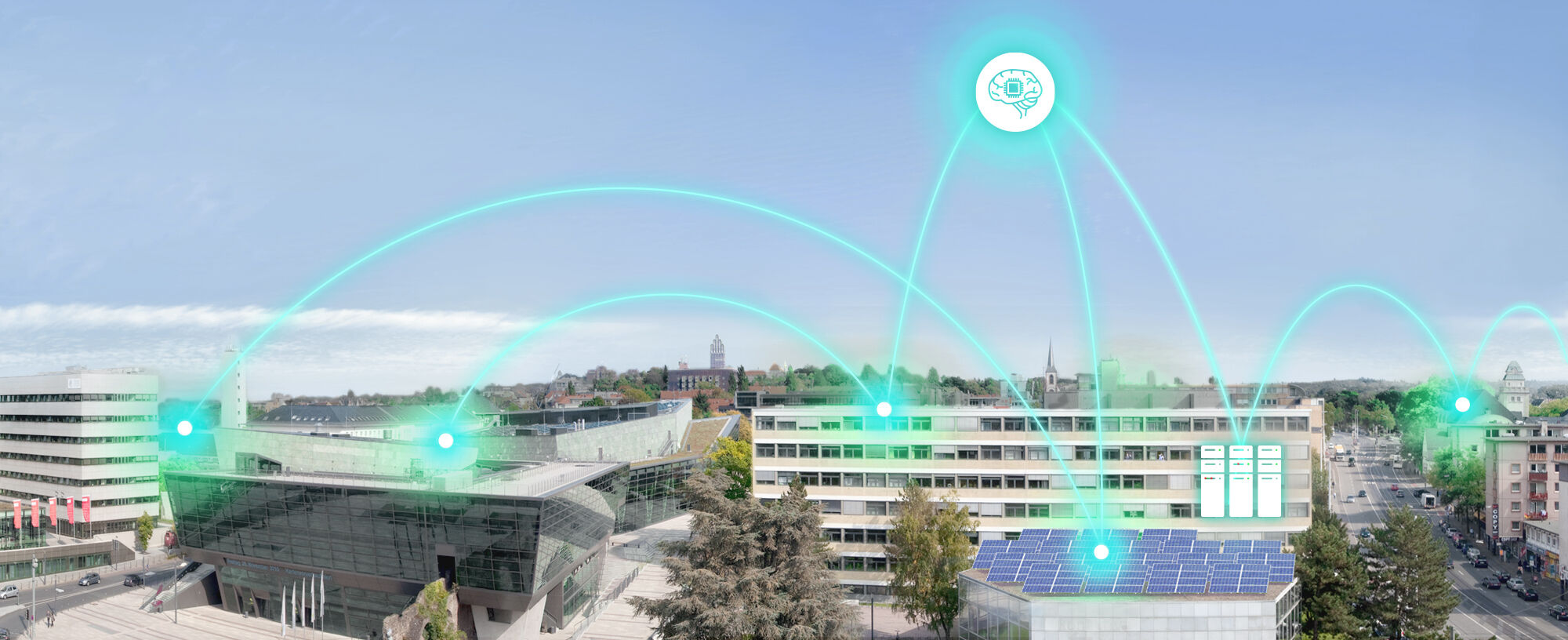Running theses and research assistant jobs
Project seminar
Student: Benjamin Seeger
Supervisor: Julia Barbosa
Time period: 10/01/2024 - 01/10/2025
Type: Project Seminars Bachelor
The decarbonization of energy systems can be achieved with the integration of renewable energy (RE) sources, and the joint analysis of the different energy forms that comprise an energy system can lead to more cost efficient RE integration strategies. An increasing complexity in the energy markets can hence be expected as new players and new strategies emerge. In this context, local energy markets are an object of study, since they can reduce the barriers to entry for new small players, such as rooftop photovoltaic owners and waster heat recovery units. Under the assumption of a perfect market, one can show that the selfish optimization of each player leads to the maximization of the total welfare. Due to the reduced number of market participants, the same is not valid in local energy markets. It has been shown in previous work [1], that diversifying the energy mix within a local thermo-electric energy market and/or adding a price cap can help improve negative social welfare effects arising from the imperfect competition. Additionally, even though only analyzing local electricity markets, Seeger has shown in [2] that the existing connection between different regions should be considered since they do impact the market outcome in each region even in cases where no energy is actually transported in the transmission grid. In this Project Seminar an existing Nash-Cournot game formulation for local thermo-electric energy markets (LTEEM) will be to be further developed and applied to evaluate the potential of using storage as market regulator agents.
Student: Luisa Emrich
Supervisor: Andrew Eliseev
Time period: 09/17/2024 - 03/05/2025
Type: Project Seminars Bachelor
The lack of real data for distribution grids is a long-standing problem in the electrical engineering community that has been raised at major scientific events. Internal non-disclosure policies of energy operators, privacy regulations and lack of political push for openness and transparency leads to the information about public infrastructure being unavailable to the public. This situation results in a status quo in which researchers are forced to test their hypotheses on standard synthetic test cases. This, however, does not allow them to obtain statistically significant observations (the number of popular synthetic cases is limited) or to test the performance of the methods developed (the size of synthetic cases is too small compared to the real grids). Thus, the creation of a massive dataset with (at least partially) true data will lead to significant improvements in the quality of research in power systems. Thankfully, the French national distribution system operator ENEDIS published the topology of the French medium-voltage grids for the entire metropolitan France (except Grenoble) under a very permissive open licence. In the recent months, Energy Information Networks & Systems department of the Technical University of Darmstadt developed a framework that allows to retrieve and automatically process the ENEDIS topology data for a desired administrative unit (such as, e.g. a particular town) of France. The access to the framework is restricted and will be granted at the start of the work on this project seminar topic.
Student: Alex Christ
Supervisor: Kirill Kuroptev
Time period: 11/14/2024 - 04/14/2025
Type: Project Seminars Bachelor
Reimplementation of the implicit enumeration algorithm, proposed by Scaparra and Church, and its application to a power line interdiction problem. Scaparra, M. P., & Church, R. L. (2008). A bilevel mixed-integer program for critical infrastructure protection planning. Computers & Operations Research, 35(6), 1905-1923. doi.org/10.1016/j.cor.2006.09.019
Bachelor theses
Student: Jan Niklas Witt
Supervisor: Sina Hajikazemi
Time period: 08/01/2023 - 02/01/2024
Type: Bachelor Thesis
Energy Planning Models (EPMs) are critical tools for simulating and guiding decisions about multimodal energy systems in specific regions or countries. These models provide strategies to meet future demands and environmental targets, which are often used by large energy companies to negotiate with the government and other investors. However, there is a concern that these profit-driven companies may manipulate the input data of EPMs to align with their interests.
This problem can be modeled as a bilevel linear programming problem, with linear lower and upper-level problems. Although bilevel programming problems are challenging in general, there are algorithms that can effectively solve them in the linear upper and lower-level form.
In this bachelor thesis, the student will develop interesting and interpretable examples of this problem for real-world EPMs that are relevant to current debates in energy policy. The goal is to show the potential impact of adversarial attacks on EPMs and to highlight the importance of developing robust models that are resistant to such attacks. The developed examples can be used as case studies to illustrate the impact of this problem on energy policy decisions and raise awareness among stakeholders in the energy sector. Requirements
• Proficiency in python programming
• Understanding of the fundamentals of mathematical programming
• Familiarity with energy planning models
• Experience with mathematical programming languages
Master theses
Student: Benedict Hanisch
Supervisor: Andreas Bott
Time period: 05/06/2024 - 11/05/2024
Type: Master Thesis
"Die Masterarbeit soll die statistische Regionalisierung der dem Szenariorahmen der e-netz Südhessen AG entnommenen Gesamtleistung von PV-Freiflächenanlagen umfassen. Durch eine Monte-Carlo-Simulation soll für jeden Mittelspannungsspeisebereich eine Verteilung der im Szenariorahmen definierten PV-Freiflächenleistung bestimmt und mithilfe statistischer Kenngrößen beschrieben werden. Ziel ist es, der e-netz eine Grundlage zu liefern, mit der sie ihre Investitionsrisiken für den durch diesen Ausbautreiber erforderlichen Netzausbau bewerten kann. Für die Simulation wird zunächst ein Raster erstellt und für jedes Element eine (nicht normierte) Wahrscheinlichkeit zur Nutztung ermittelt. Diese beruht auf einer Klassifizierung des Elements (z.B. Bebaut, Deponie, ... nähe zu Straßen). Die Kategorien werden in der Arbeit basierend auf Förderkriterien festgelegt. Die MC Simulation soll dann insbesondere diese Wahrscheinlichkeiten berücksichtigen. Ein weiteres Ziel ist es, dass die durchschnittliche Größe einer zusammenhängenden Anlage (umfasst mehrere Rasterelemente) der üblichen Anlagengröße für Freifächen PV entspricht. Hierzu werden verschiedene MC Algorithmen getestet. Insbesondere findet ein Sampling basierend auf dem ISING-modell statt. " , Python, good programming skills, Statistics, Software developement, Literature Studies, Numerical Algorithm, Probabilistic modeling, Written in German
Student: Luisa Emrich
Supervisor: Andrei Eliseev
Time period: 05/12/2025 - 11/10/2025
Type: Master Thesis
The objective of this research is to develop grid models where an AC power flow with plausible results can be computed. Since there are many unknowns in the conversion process and, hence, no unique ‘right’ solution can be expected, several options shall be generated. This can be modelled via a probabilistic model for all the choices that can be influenced. Specifically, a Markov chain Monte Carlo-based (MCMC-based) heuristic shall be developed to convert the topology of the real French distribution grids and assign buses and lines in with synthetic values for load, impedance, etc. The approach shall be verified by the feasibility of the computed solutions by calculating the AC power flow.
Student: Katharine Buntrock
Supervisor: Tobias Gebhard
Time period: 01/05/2026 - 07/06/2026
Type: Master Thesis
With the rapid electrification of mobility and heating, as well as the rise of solar PV and flexible demand, distribution grids face unprecedented challenges. The increasing energy demand often requires expansion of infrastructure, which is costly. Existing design practices are based on simple, outdated rules, often leading to over-dimensioning of capacities because reliability margins cannot be quantified sufficiently. First, they usually treat power demand as a fixed maximum value, ignoring the inherently probabilistic nature of electric loads. Second, the type of consumers, their individual consumption patterns (e.g. daily/seasonal), and load correlations with other consumers are neglected, but can have a significant impact on the maximum load. For a successful and cost-efficient energy transition, new data-driven approaches for grid planning and optimization are needed.
This thesis aims to change the way, low-voltage (LV) grids are designed by developing a data-driven, probabilistic, correlation-aware methodology. An optimization problem for capacity design, topological transformer placement, and switch placement/configuration is defined and analyzed. The approach is based on multivariate statistical modeling (e.g. normal distribution). To test and evaluate the method, a data analysis of electricity usage patterns from heterogeneous consumers (e.g. residential, commercial, retail, etc) is carried out.
- Literature review of current practices and methods for LV grid planning
- Research for electricity demand datasets of small public/commercial buildings (e.g. shops, retail, hotel, bakery etc)
- Analyze consumer demand correlations of power demand time series data
- Develop a probabilistic methodology for capacity design, optimal transformer placement, and/or consumer partition by considering the correlations
- Implement and test the algorithm and evaluate the performance by comparing it with traditional, deterministic approaches
Requirements:
- Interest in optimization and statistical modeling
- Basic experience with programming and data analysis (e.g. Python)
- Attendance in lecture “Data-driven Modeling / datengetriebene Modellierung (Machine Learning)” helpful
- Attendance in lecture “Energy Management & Optimization” helpful
- If the thesis is done as B.Sc, very good grades and self-organized acquisition of the prerequisites are expected



